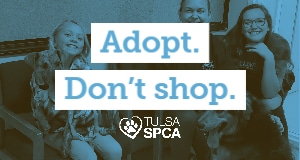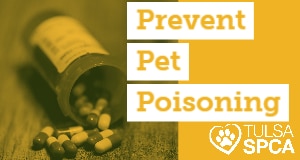
Adopt Don’t Shop
March 4, 2020
TULSA SPCA RECEIVES $34,860 GRANT FROM PETSMART CHARITIES®
March 19, 2020This week (March 15-21) is National Pet Poison Prevention Week, and the Tulsa SPCA urges you to protect the dogs and cats in your family from poisoning.
“Accidental poison ingestion by pets is a very common cause of emergency room visits,” said Tulsa SPCA veterinarian Dr. David Bailey. “This can often be prevented by taking simple steps to prevent access to dangerous substances.”

Sunny enjoys dog treats. It’s important to remember that many human foods can be toxic to dogs and cats. The Tulsa SPCA uses Pup-Peroni treats as well as peanut butter and Milk-Bone. Click the photo to link to our Amazon Charity List to purchase and donate treats to the Tulsa SPCA. Your gift will be sent directly to the shelter.
Common toxins that poison dogs and cats:
- Human medications as well as dietary supplements and vitamins (iron, Vitamin D and alpha-lipoic acid can be highly toxic in overdose situations)
- Human foods including chocolate, xylitol sugarless sweetener, raisins and grapes, macadamia nuts, garlic and onions, unbaked yeast dough, table salt
- Insecticides
- Mouse and rat poisons
- Some glues, such as Gorilla Glue, expand greatly once ingested and require surgical removal. Just one ounce of glue may expand to the size of a basketball.
- Antifreeze
Never medicate your pet with human products without first contacting your veterinarian. Some common human medications such as acetaminophen (Tylenol) and ibuprofen (Advil) are extremely poisonous to pets.
“Sadly, many pets are poisoned by well-meaning owners who were only trying to alleviate their pet’s pain,” Dr. Bailey said. “Most pain medications that are considered safe for humans are very dangerous for dogs and cats. These accidents can be prevented by simply contacting your veterinarian if you feel that your pet needs a pain reliever.”
Many household plants are potentially toxic to your pets. Be advised that the consumption of any plant material may cause vomiting and gastrointestinal upset for dogs and cats. Even if a plant is listed as non-toxic, eating any part of it might make your pet sick.
Common plants that are poisonous to pets:
- Lilies (all members of the Lilium spp. family)
- Marijuana
- Sago palm
- Tulip/Narcissus bulbs
- Azalea/Rhododendron
- Oleander
- Castor bean (Ricinus communis)
- Cyclamen (especially roots)
- Kalanchoe succulent
- Yew
- Amaryllis
- Autumn Crocus
- Chrysanthemum
- English ivy (aka branching ivy, glacier ivy, needlepoint ivy, sweetheart ivy and California ivy)
- Pothos (devil’s vine, devil’s ivy)
- Shefflera (umbrella tree)
If you think your pet may have ingested something harmful, take action immediately. Contact your veterinarian or call a pet poison hotline.
- Pet Poison Helpline: 1-800-213-6680. $39 per call includes unlimited follow-up consultations.
- Animal Poison Control Center (APCC): (888) 426-4435. A consultation fee may apply.


